英语全国 卷真题及答案
- 格式:docx
- 大小:23.90 KB
- 文档页数:9

精选全文完整版(可编辑修改)历年英语高考真题全国卷及答案高考学习最重要的是要多试和多练,试试并非受罪,问问并不吃亏。
高考加油!下面是店铺为大家推荐的历年英语高考真题全国卷,仅供大家参考!历年英语高考真题全国卷第一部分阅读理解(共两节,满分40分)第一节(共15题;每小题2分,满分30分)阅读下列短文,从每题所给的四个选项(A、B、C和D)中,选出最佳选项,并在答案卡上将该项涂黑。
AThe Metropolitan Museum of Art (Met) is one of the world’s largest and finest art museums. Following the suggested route will help you explore the museum.The Temple of DendurThis 2000-year-old building stood near the Nile River, surrounded by a wall that no longer exists. But you can still peek through t he gateway. Whose “house” is this? It's not for people. It’s for gods. Can you identify them? They face out. A king faces in, bringing offerings.MetSpeaksBringing together some of the most respected thinkers on a given subject, MetSpeaks features lectures, discussions, talks, films, and forums in which compelling voices explore timely issues that connect to the Met’s exhibitions and permanent collection. Program times, audiences, and topics vary.Time to SketchSettle down for a few minutes, pick something in this gallery, and have fun drawing it. Enjoy the chance to look carefully as youcreate your own sketch. You'll be surprised at how much more you notice, thanks to exploring art by sketching.MetAccessMake the Met yours! Choose from a variety of services and exciting programs that are tailored to meet the needs of visitors with disabilities. Program times, audiences, and topics vary.Ask for the Access Information brochure and Access Calendar at Information Desks, download the Access Calendar (PDF),*********************************************.AdmissionFee includes admission to the Main Building and same-week admission to the Cloisters museum and gardens.Recommended FeeAdults $25Seniors (65 and older) $17Students $12Members (Join Now) FreeChildren under 12 (accompanied by an adult) Free1. How much is recommended to pay for 3 adult and 2 student visitors?A. 99B. 111C. 87D. 1032. What can you know about the Temple of Dendur?A. A high wall is surrounding the 2000-year-old building now.B. A king faces out, bringing offerings in the temple.C. The building is designed for Emperor to live in.D. The Nile River witnessed the history of the building.3. Which of the following is TRUE about the Met?A. Issues connected with economic crisis will be discussed in MetSpeaks.B. Visitors can choose something in the gallery and have fundrawing it on the wall.C. Disabled people will find various services and programs offered especially for them.D. You can email ********************for more Admission information.BOn May 28th, 1998 I was driving my 13-year-old daughter and 14-year-old son to school. Unfortunately my car crashed with a truck. All three of us were critically injured. Stacey’s brain injury was the most severe. Despite all attempts to save her, she died two days later. When I became conscious, I heard my husband talking to the organ donor coordinator(器官捐助协调员).We knew that Stacey would want that because that’s the kind of person she was. She always wanted to assist people. She was always smiling and brought so much joy to others. She was friendly and enjoyed writing stories and poetry.It has been a comfort to know that Stacey lives on in the lives of others. I have even met the family of one of Stacey’s kidney recipients (接受人). This little girl was 6 years old at the time of the transplant. She was suffering from Nephrotic Syndrome. I saw pictures showing the effects of the Nephrotic Syndrome and the pictures of her after the transplant. They already showed an amazing difference. We correspond every year through letters, cards and pictures. The girl is doing really well at school and will be graduating from high school next year. I am so grateful that we have this relationship. I also feel relieved that my daughter has made so great a difference to a person’s life.Over the years, I have had some kind of contact with all of the recipients except the heart recipient. I’m very sorry for that.I would love to hear something from the heart recipient’s family.There are so many things that I wonder about her. I wonder if she is anything like Stacey. Does she smile all the time? Does she enjoy writing stories and poetry? I do hope that they can contact us!I feel guilty because I was the one driving in the accident which caused Stacey’s death. I also feel proud that my daughter has helped so many people.4. When did Stacey die from the traffic accident?A. On May 28th, 1998B. On May 29th, 1998C. On May 31st, 1998D. On May 30th, 19985. What does the underlined word “They” refers to?A. The pictures taken after the transplant.B. The people who received the organs of Stacey.C. The people who cared for the girl in the hospital.D. The pictures showing the effects of the Nephrotic Syndrome.6. What is the writer’s attitude towards her daughter’s organ donation?A. GratefulB. DissatisfiedC. ProudD. Guilty7. What has the writer been looking forward to doing?A. Contacting the kidney recipient’s family.B. Visiting kidney recipient’s family.C. Getting paid from the heart family.D. Seeing the heart recipient.CWhen we give our kids holiday gifts, many of us can’t wait to hear their appreciative cries of “thank you!” once the wrapping gets ripped off. But here’s a tip: You’d be wise not to expect much gratitude from them for what they receive.Gratitude can make us happier, healthier, and even fitter. Butdo the kids show their gratitude for the stuff we buy them? All the research I’ve done has convinced me that it won’t happen. One mom told me that when she asked her 16-year-old son to thank he r for buying him a cellphone, he said, “But that’s what moms should do.” From a teenager’s angle, it’s a parent’s responsibility to take care of the family. According to Dunham, Yale’s assistant professor of psychology, “When teenagers code it that way, a gift is no longer something given freely and voluntarily”—it’s just mom and dad living up to their obligation.Parents do have the right to demand good manners and children should thank sincerely whoever gives them something. But kids can’t know how blesse d they are unless they have a basis for comparison. And they don’t learn that by a parent complaining that they’re ungrateful. We need to give our children the gift of a wider world view. Show by example that gratitude isn’t about stuff—which ultimately ca n’t make any of us happy anyway. It’s about realizing how lucky you are and paying your good fortune forward.You can collect all the charitable appeals and sit down together with the kids to go through them. You set the budget for giving and the kids de cide how it’s distributed. Once the conversation about gratitude gets started, it’s much easier to continue all year. Also you can set up a family routine at bedtime where kids describe three things that have made them grateful. When kids go off to college, you can text them a picture each week of something that inspires your appreciation.Teaching children to focus on the positive and appreciate the good in their lives is perhaps the greatest gift we can give them. And we can all learn together that the things that really matteraren’t on sale at a department store.8. How do children respond when receiving gifts from their parents?A. They show no interest in their parents’ gifts.B. They can’t wait to open their parents’ gifts.C. They show much gratitude to their parents for the gifts.D. They take their parents’ gifts for granted.9. To make children grateful for what they have, parents should _________.A. live up to their obligationB. ask their children to have good mannersC. teach their children by setting an exampleD. complain their children are ungrateful10. What can we learn from the last two paragraphs?A. No gifts are greater than teaching children to be positive and grateful.B. Children ought to realize how lucky they are to have considerate parents.C. Children are supposed to decide how to distribute their own moneyD. It is easy for parents to start the conversation about gratitude.11. What’s the purpose of the author writing this text?A. To explain the reason why children offer no gratitude to their parents.B. To give advice to parents on how to help children develop gratitude.C. To encourage parents to do things together with their children.D. To remind parents of their responsibility to educate theirchildren.DPeople with an impulsive personality refer to those who tend to do things without considering the possible dangers or problems first. According to a new study by researchers at the University of Georgia, such people may be more likely to have food addiction. The study found that people exhibiting impulsive behavior weren’t necessarily overweight, but impulsiveness was related to a direct relationship with food, and therefore, less healthy weight.Food addiction has been compared to addictive drug use. Studies have linked the dopamine (多巴胺) release that occurs after tasting delicious food to the dopamine release that happens when people consume other addictive substances.Impulsive behavior involves several personality traits (特点). Two of these traits, known as negative urgency and lack of perseverance, were particularly associated with food addiction and high BMI (身体质量指数) during the study.Negative urgency is characterized by the tendency to behave impulsively when experiencing negative emotions. Some people might drink alcohol or take drugs. For others, it could mean eating to feel better. Lack of perseverance is when a person has a hard time finishing hard or boring tasks. People with a lack of perseverance might have difficulty attempting to change addictive eating behavior, which could also cause obesity.“Impulsiveness might be one reason why some people eat in an addictive way despite motivation to lose weight,” said Dr. Ashley Gearhardt, a clinical psychologist. He was involved in developing the Yale Food Addiction Scale in aid of those people. “We are theorizing that if food addiction is really a thing, thenour measure, the Yale Food Addiction Scale, should be related to helping control impulsive action,” said Gearhardt.Clinical psychologist Dr. James MacKillop, whose lab was conducting the study, believes that therapies used to treat addictive drug behavior could help people who suffer from addictive eating habits.“Most of the programs for weight loss at this point focus on the most obvious things, which are clearly diet and exercise,” MacKillop said. “It seems that managing strong desires to eat would naturally fit in with the skills a person would need to eat healthily.”12. According to Paragraph 1, the result of food addiction is ________.A. less healthy weightB. motivation to lose weightC. negative emotionsD. taking alcohol or drugs13. How does the author introduce the two personality traits in Paragraph 4?A. By making comparisons and conclusions.B. By explaining causes and effects.C. By presenting questions and answers.D. By giving definitions and examples.14. What can be inferred about the Yale Food Addiction Scale from the text?A. It has been successfully carried out among overweight people.B. It might help some impulsive people with food addiction to lose weight.C. It will prove whether food addiction is a problem to impulsive people.D. It is theoretically a proper treatment for addictive food anddrug behavior.15. Which of the following can be the best title for the text?A. Dopamine release caused by food addictionB. Food addiction compared to drug useC. Impulsive personality linked to food additionD. Food addiction contributing to obesity。
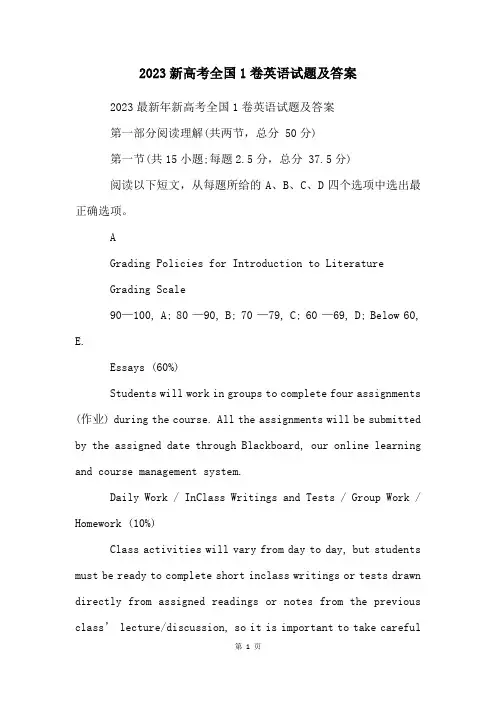
2023新高考全国1卷英语试题及答案2023最新年新高考全国1卷英语试题及答案第一部分阅读理解(共两节,总分 50分)第一节(共15小题;每题2.5分,总分 37.5分)阅读以下短文,从每题所给的A、B、C、D四个选项中选出最正确选项。
AGrading Policies for Introduction to LiteratureGrading Scale90—100, A; 80 —90, B; 70 —79, C; 60 —69, D; Below 60, E.Essays (60%)Students will work in groups to complete four assignments (作业) during the course. All the assignments will be submitted by the assigned date through Blackboard, our online learning and course management system.Daily Work / InClass Writings and Tests / Group Work / Homework (10%)Class activities will vary from day to day, but students must be ready to complete short inclass writings or tests drawn directly from assigned readings or notes from the previous class’ lecture/discussion, so it is important to take carefulnotes during class. Additionally, from time to time I will assign group work to be completed in class or short assignments to be completed at home, both of which will be graded.Late WorkAn essay not submitted in class on the due date will losea letter grade for each class period it is late. If it is not turned in the the 4th day after the due date, it will earn a zero. Daily assignments not completed during class will get a zero. Short writings missed as a result of an excused absence will be accepted.21. Where is this text probably taken from?A. A textbook.B. An exam paper.C. A course plan.D. An academic article.22. How may parts is a student’s final grade made up of?A. Two.B. Three.C. Four.D. Five.23. What will happen if you submit an essay one week after the due date?A. You will receive a zero.B. You will lose a letter grade.C. You will be given a test.D. You will have to rewrite it.BLike most of us, I try to be mindful of food that goesto waste. The arugula (芝麻菜) was to make a nice green salad, rounding out a roast chicken dinner. But I ended up working late. Then friends called with a dinner invitation. I stuck the chicken in the freezer. But as days passed, the arugula went bad. Even worse, I had unthinkingly bought way too much; I could have made six salads with what I threw out.In a world where nearly 800 million people a year go hungry, “food waste goes against the moral grain,” as Elizabeth Royte writes in this month’s cover story. It’s jawdropping how much perfectly good food is thrown away —from “ugly” (but quite eatable) vege tables rejected by grocers to large amounts of uneaten dishes thrown into restaurant garbage cans.Producing food that no one eats waste the water, fuel, and other resources used to grow it. That makes food waste an environmental problem. In fact, R oyte writes, “if food waste were a country, it would be the third largest producer of greenhouse gases in the world.”If that’s hard to understand, let’s keep it as simple as the arugula at the back of my refrigerator. Mike Curtin sees my arugula story all the time —but for him, it’s more like 12 boxes of donated strawberries nearing their last days.Curtin is CEO of DC Central Kitchen in Washington D.C., which recovers food and turns it into healthy meals. Last year it recovered more than 807,500 pounds of food by taking donations and collecting blemished (有瑕疵的) produce that otherwise would have rotted in fields. And the strawberries? Volunteers will wash, cut, and freeze or dry them for use in meals down the road.Such methods seem obvious, y et so often we just don’t think. “Everyone can play a part in reducing waste, whether by not purchasing more food than necessary in your weekly shopping or by asking restaurants to not include the side dish you won’t eat,” Curtin says.24. What does the author want to show by telling the arugula story?A. We pay little attention to food waste.B. We waste food unintentionally at times.C. We waste more vegetables than meat.D. We have good reasons for wasting food.25. What is a consequence of food waste according to the text?A. Moral decline.B. Environmental harm.C. Energy shortage.D. Worldwide starvation.26. What does Curtin’s company do?A. It produces kitchen equipment.B. It turns rotten arugula into clean fuel.C. It helps local farmers grow fruits.D. It makes meals out of unwanted food.27. What does Curtin suggest people do?A. Buy only what is needed.B. Reduce food consumption.C. Go shopping once a week.D. Eat in restaurants less often.CThe elderly residents (居民) in care homes in London are being given hens to look after to stop them feeling lonely. The project was dreamed up by a local charity (慈善组织) to reduc e loneliness and improve elderly people’s wellbeing. It is also being used to help patients suffering dementia, a serious illness of the mind. Staff in care homes have reported a reduction in the use of medicine where hens are in use.Among those taking part in the project is 80yearold Ruth Xavier. She said, “I used to keep hens when I was younger and had to prepare their breakfast each morning before I went to school.“I like the project a lot. I am down there in my wheelchair in the morning letting the hens out and down there again at night to see they’ve gone to bed.“It’s good to have a different focus. People have been bringing their children to see the hens and residents come and sit outside to watch them. I’m enjoying the creative activities, and it feels great to have done something useful.” There are now 700 elderly people looking after hens in 20 care homes in the North East, and the charity has been given financial support to roll it out countrywide.Wendy Wilson, extra care manager at 60 Penfold Street, one of the first to embark on the project, said, “Residents really welcome the idea of the project and the creative sessions. We are looking forward to the benefits and fun the project can bring to people here.”Lynn Lewis, director of Notting Hill Pathways, said, “We are happy to be taking part in the project. It will really help connect our residents through a shared interest and creative activities.”28. What is the purpose of the project?A. To ensure harmony in care homes.B. To provide parttime jobs for he aged.C. To raise money for medical research.D. To promote the elderly people’s welfare.29. How has the project affected Ruth Xavier?A. She has learned new life skills.B. She has gained a sense of achievement.C. She has recovered her memory.D. She has developed a strong personality.30. What do the underlined words “embark on” mean in paragraph 7?A. Improve.B. Oppose.C. Begin.D. Evaluate.31. What can we learn about the project from the last two paragraphs?A. It is well received.B. It needs to be more creative.C. It is highly profitable.D. It takes ages to see the results.DHuman speech contains more than 2,000 different sounds, from the common “m” and “a” to the rare clicks of some southern African languages. But why are certain sounds more common than others? A groundbreaking, fiveyear study shows that dietrelated changes in human bite led to new speech sounds that are now found in half the world’s languages.More than 30 years ago, the scholar Charles Hockett noted that speech sounds called labiodentals, such as “f” and “v”, were more common in the languages in society that ate softer foods. Now a team of researchers led by Damian Blasi at the University of Zurich, Switzerland, has found how and why this trend arose.They discovered the upper and lower front teeth of ancient human adults were aligned(对齐), making it hard to produce labiodentals, which are formed by touching the lower lip to the upper teeth. Later, our jaws changed to an overbite structure (结构), making it easier to produce such sounds. The team showed that this change in bite was connected with the development of agriculture in the Neolithic period. Food became easier to chew at this point. The jawbone didn’t have to do as much work and so didn’t grow to be so large. Analyses of a language database also confirmed that there was a global change in the sound of world languages after the Neolithic age, with the use of “f” and “v” increasing remarkably during the last few thousand years. These sounds are still not found in the languages of many huntergatherer people today.This research overturns the popular view that all humanspeech sounds were present when human beings evolved around 300,000 years ago. “The set of speech sounds we use has not necessarily remained stable since the appearance of human beings, but rather the huge variety of speech sounds that we find today is the product of a complex interplay of things like biological change and cultural evolution,” said Steven Moran,a member of the research team.32. Which aspect of the human speech sound does Damian Blasi’s research focus on?A. Its variety.B. Its distribution.C. Its quantity.D. Its development.33. Why was it difficult for ancient human adults to produce labiodentals?A. They had fewer upper teeth than lower teeth.B. They could not open and lose their lips easily.C. Their jaws were not conveniently structured.D. Their lower front teeth were not large enough.34. What is paragraph 5 mainly about?A. Supporting evidence for the research results.B. Potential application of the research findings.C. A further explanation of the research methods.D. A reasonable doubt about the research process.35. What does Steven Moran say about the set of human speech sounds?A. It is key to effective communication.B. It contributes much to cultural diversity.C. It is a complex and dynamic system.D. It drives the evolution of human beings.其次节(共5小题;每题2.5分,总分 12.5分)阅读下面短文,从短文后的选项中选出可以填入空白处的最正确选项。
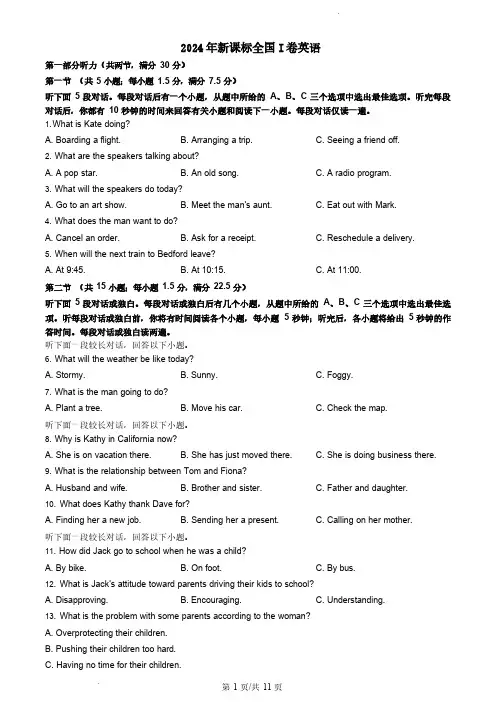
2024年新课标全国I卷英语第一部分听力(共两节,满分 30 分)第一节 (共5 小题;每小题 1.5 分,满分 7.5 分)听下面 5 段对话。
每段对话后有一个小题,从题中所给的 A、B、C 三个选项中选出最佳选项。
听完每段对话后,你都有 10 秒钟的时间来回答有关小题和阅读下一小题。
每段对话仅读一遍。
1.What is Kate doing?A.Boarding a flight.B. Arranging a trip.C. Seeing a friend off.2.What are the speakers talking about?A.A pop star.B. An old song.C. A radio program.3.What will the speakers do today?A.Go to an art show.B. Meet the man's aunt.C. Eat out with Mark.4.What does the man want to do?A.Cancel an order.B. Ask for a receipt.C. Reschedule a delivery.5.When will the next train to Bedford leave?A.At 9:45.B. At 10:15.C. At 11:00.第二节 (共15 小题;每小题 1.5 分,满分 22.5 分)听下面 5 段对话或独白。
每段对话或独白后有几个小题,从题中所给的 A、B、C 三个选项中选出最佳选项。
听每段对话或独白前,你将有时间阅读各个小题,每小题 5 秒钟;听完后,各小题将给出 5 秒钟的作答时间。
每段对话或独白读两遍。
听下面一段较长对话,回答以下小题。
6.What will the weather be like today?A.Stormy.B. Sunny.C. Foggy.7.What is the man going to do?A.Plant a tree.B. Move his car.C. Check the map.听下面一段较长对话,回答以下小题。
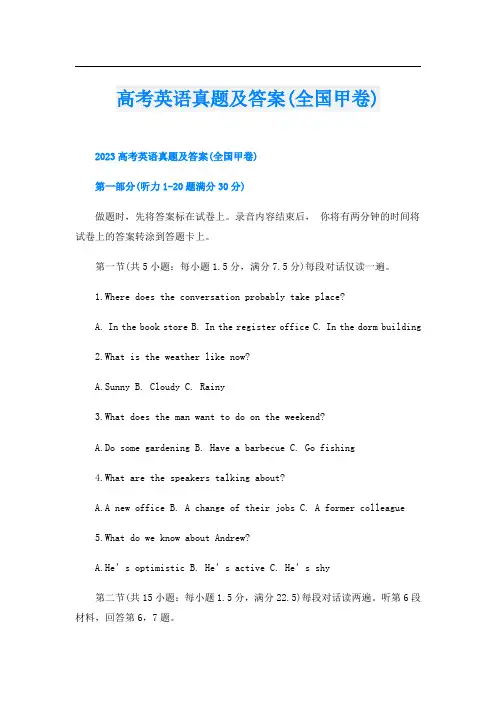
高考英语真题及答案(全国甲卷)2023高考英语真题及答案(全国甲卷)第一部分(听力1-20题满分30分)做题时,先将答案标在试卷上。
录音内容结束后,你将有两分钟的时间将试卷上的答案转涂到答题卡上。
第一节(共5小题:每小题1.5分,满分7.5分)每段对话仅读一遍。
1.Where does the conversation probably take place?A. In the book storeB. In the register officeC. In the dorm building2.What is the weather like now?A.SunnyB. CloudyC. Rainy3.What does the man want to do on the weekend?A.Do some gardeningB. Have a barbecueC. Go fishing4.What are the speakers talking about?A.A new officeB. A change of their jobsC. A former colleague5.What do we know about Andrew?A.He’s optimisticB. He’s activeC. He’s shy第二节(共15小题:每小题1.5分,满分22.5)每段对话读两遍。
听第6段材料,回答第6,7题。
6.Which of the following does the woman dislike?A.The bedroomB. The sitting roomC. The kitchen7.What does the woman suggest they do next?A.Go to another agencyB. See some other flatsC. Visit the neighbours听第7段材料,回答第8,9题。
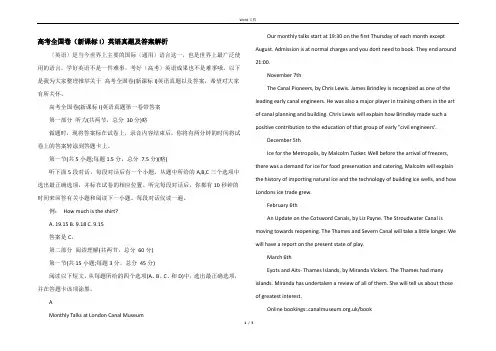
高考全国卷(新课标I)英语真题及答案解析〔英语〕是当今世界上主要的国际〔通用〕语言这一,也是世界上最广泛使用的语言。
学好英语不是一件难事,考好〔高考〕英语成果也不是难事哦。
以下是我为大家整理推举关于高考全国卷(新课标I)英语真题以及答案,希望对大家有所关怀。
高考全国卷(新课标I)英语真题第一卷带答案第一部分听力(共两节,总分30分)略做题时,现将答案标在试卷上,录音内容结束后,你将有两分钟的时间将试卷上的答案转涂到答题卡上。
第一节(共5小题;每题1.5分,总分7.5分)(略)听下面5段对话,每段对话后有一个小题。
从题中所给的A,B,C三个选项中选出最正确选项,并标在试卷的相应位置。
听完每段对话后,你都有10秒钟的时间来回答有关小题和阅读下一小题。
每段对话仅读一遍。
例:How much is the shirt?A. 19.15B. 9.18C. 9.15答案是C。
第二部分阅读理解(共两节,总分60分)第一节(共15小题;每题3分,总分45分)阅读以下短文,从每题所给的四个选项(A、B、C、和D)中,选出最正确选项,并在答题卡该项涂黑。
AMonthly Talks at London Canal MuseumOur monthly talks start at 19:30 on the first Thursday of each month except August. Admission is at normal charges and you dont need to book. They end around 21:00.November 7thThe Canal Pioneers, by Chris Lewis. James Brindley is recognized as one of the leading early canal engineers. He was also a major player in training others in the art of canal planning and building. Chris Lewis will explain how Brindley made such a positive contribution to the education of that group of early "civil engineers'.December 5thIce for the Metropolis, by Malcolm Tucker. Well before the arrival of freezers, there was a demand for ice for food preservation and catering, Malcolm will explain the history of importing natural ice and the technology of building ice wells, and how Londons ice trade grew.February 6thAn Update on the Cotsword Canals, by Liz Payne. The Stroudwater Canal is moving towards reopening. The Thames and Severn Canal will take a little longer. We will have a report on the present state of play.March 6thEyots and Aits- Thames Islands, by Miranda Vickers. The Thames had many islands. Miranda has undertaken a review of all of them. She will tell us about those of greatest interest.Online bookings:/bookMore into:/whatsonLondon Canal Museum12-13 New Wharf Road, London NI 9RT.canalmuseum.mobiTel:020 ********21. When is the talk on James Brindley?A. February 6th.B. March 6th.C. November 7th.D. December 5th.22. What is the topic of the talk in February?A. The Canal Pioneers.B. Ice for the MetropolisC. Eyots and Aits- Thames IslandsD. An Update on the Cotsword Canals23. Who will give the talk on the islands in the Thames.A. Miranda VickersB. Malcolm TuckerC. Chris LewisD. Liz Payne【答案】21. C22. D23. A【解析】试题分析:文章主要介绍了在伦敦运河博物馆每个月的讲座支配。
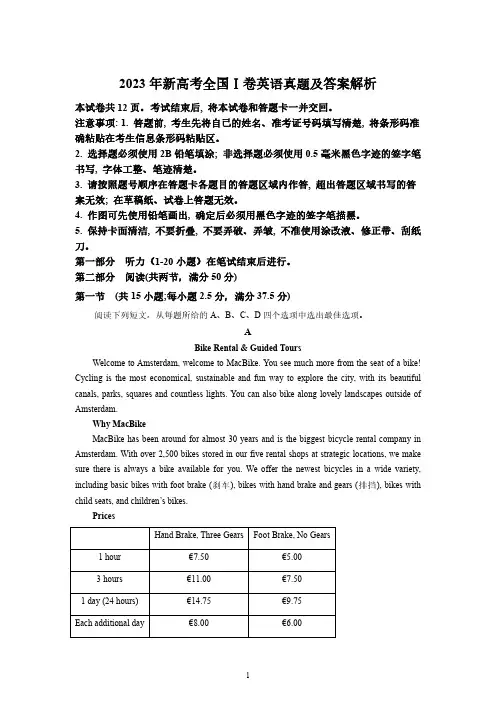
2023年新高考全国Ⅰ卷英语真题及答案解析本试卷共12页。
考试结束后,将本试卷和答题卡一并交回。
注意事项:1.答题前,考生先将自己的姓名、准考证号码填写清楚,将条形码准确粘贴在考生信息条形码粘贴区。
2.选择题必须使用2B铅笔填涂;非选择题必须使用0.5毫米黑色字迹的签字笔书写,字体工整、笔迹清楚。
3.请按照题号顺序在答题卡各题目的答题区域内作答,超出答题区域书写的答案无效;在草稿纸、试卷上答题无效。
4.作图可先使用铅笔画出,确定后必须用黑色字迹的签字笔描黑。
5.保持卡面清洁,不要折叠,不要弄破、弄皱,不准使用涂改液、修正带、刮纸刀。
第一部分听力(1-20小题)在笔试结束后进行。
第二部分阅读(共两节,满分50分)第一节(共15小题;每小题2.5分,满分37.5分)阅读下列短文,从每题所给的A、B、C、D四个选项中选出最佳选项。
ABike Rental&Guided ToursWelcome to Amsterdam,welcome to MacBike.You see much more from the seat of a bike! Cycling is the most economical,sustainable and fun way to explore the city,with its beautiful canals,parks,squares and countless lights.You can also bike along lovely landscapes outside of Amsterdam.Why MacBikeMacBike has been around for almost30years and is the biggest bicycle rental company in Amsterdam.With over2,500bikes stored in our five rental shops at strategic locations,we make sure there is always a bike available for you.We offer the newest bicycles in a wide variety, including basic bikes with foot brake(刹车),bikes with hand brake and gears(排挡),bikes with child seats,and children’s bikes.PricesHand Brake,Three Gears Foot Brake,No Gears1hour€7.50€5.003hours€11.00€7.501day(24hours)€14.75€9.75Each additional day€8.00€6.00Guided City ToursThe2.5-hour tour covers the Gooyer Windmill,the Skinny Bridge,the Rijksmuseum, Heineken Brewery and much more.The tour departs from Dam Square every hour on the hour, starting at1:00pm every day.You can buy your ticket in a MacBike shop or book online.1.What is an advantage of MacBike?A.It gives children a discount.B.It of offers many types of bikes.C.It organizes free cycle tours.D.It has over2,500rental shops.2.How much do you pay for renting a bike with hand brake and three gears for two days?A.€15.75.B.€19.50.C.€22.75.D.€29.50.3.Where does the guided city tour start?A.The Gooyer,Windmill.B.The Skinny Bridge.C.Heineken Brewery.D.Dam Square.【答案】1.B 2.C 3.D【解析】【导语】本文是一篇应用文。
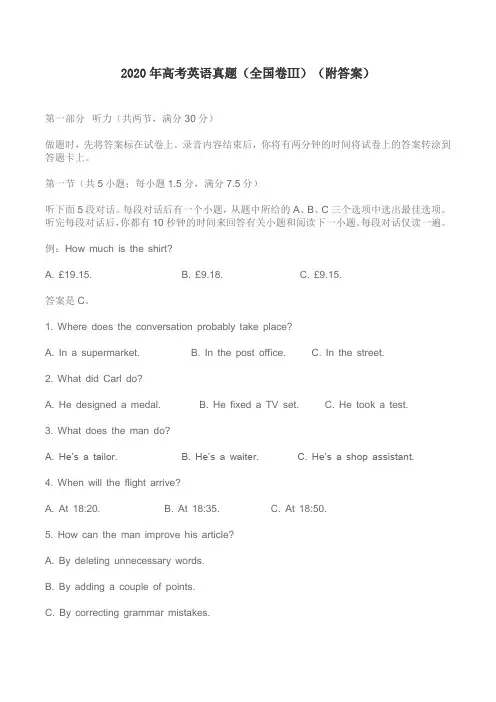
2020年高考英语真题(全国卷Ⅲ)(附答案)第一部分听力(共两节,满分30分)做题时,先将答案标在试卷上。
录音内容结束后,你将有两分钟的时间将试卷上的答案转涂到答题卡上。
第一节(共5小题;每小题1.5分,满分7.5分)听下面5段对话。
每段对话后有一个小题,从题中所给的A、B、C三个选项中选出最佳选项。
听完每段对话后,你都有10秒钟的时间来回答有关小题和阅读下一小题。
每段对话仅读一遍。
例:How much is the shirt?A. £19.15.B. £9.18.C. £9.15.答案是C。
1. Where does the conversation probably take place?A. In a supermarket.B. In the post office.C. In the street.2. What did Carl do?A. He designed a medal.B. He fixed a TV set.C. He took a test.3. What does the man do?A. He’s a tailor.B. He’s a waiter.C. He’s a shop assistant.4. When will the flight arrive?A. At 18:20.B. At 18:35.C. At 18:50.5. How can the man improve his article?A. By deleting unnecessary words.B. By adding a couple of points.C. By correcting grammar mistakes.第二节(共15小题;每小题1.5分,满分22.5分)听下面5段对话或独白。
每段对话或独白后有几个小题,从题中所给的A、B、C三个选项中选出最佳选项。
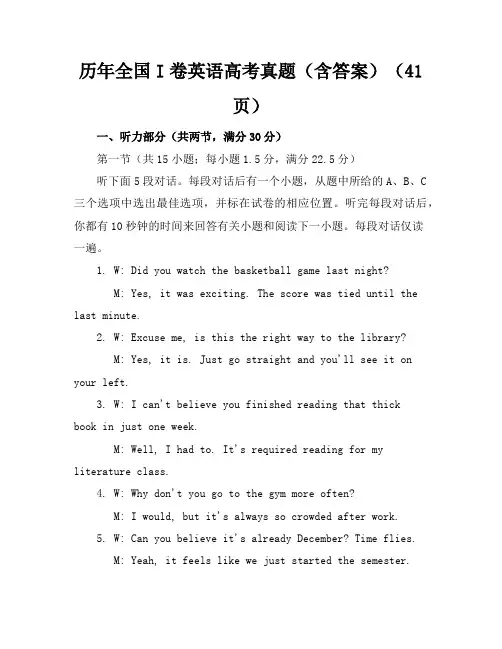
历年全国I卷英语高考真题(含答案)(41页)一、听力部分(共两节,满分30分)第一节(共15小题;每小题1.5分,满分22.5分)听下面5段对话。
每段对话后有一个小题,从题中所给的A、B、C 三个选项中选出最佳选项,并标在试卷的相应位置。
听完每段对话后,你都有10秒钟的时间来回答有关小题和阅读下一小题。
每段对话仅读一遍。
1. W: Did you watch the basketball game last night?M: Yes, it was exciting. The score was tied until the last minute.2. W: Excuse me, is this the right way to the library?M: Yes, it is. Just go straight and you'll see it on your left.3. W: I can't believe you finished reading that thickbook in just one week.M: Well, I had to. It's required reading for my literature class.4. W: Why don't you go to the gym more often?M: I would, but it's always so crowded after work.5. W: Can you believe it's already December? Time flies.M: Yeah, it feels like we just started the semester.第二节(共15小题;每小题1.5分,满分22.5分)听下面5段对话或独白。
每段对话或独白后有几个小题,从题中所给的A、B、C三个选项中选出最佳选项,并标在试卷的相应位置。
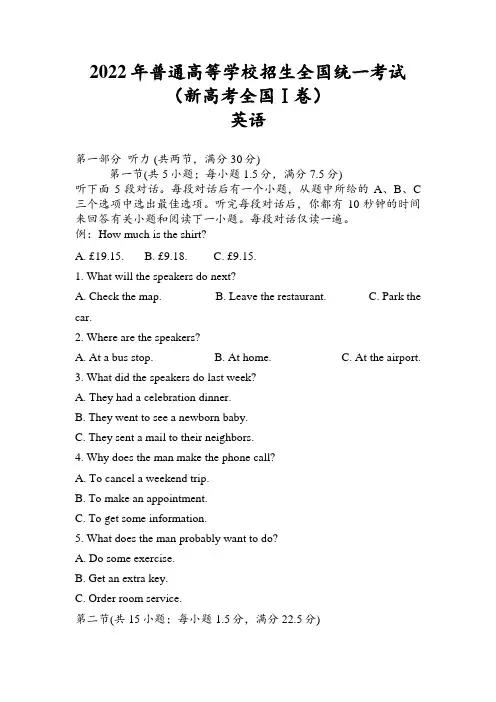
2022年普通高等学校招生全国统一考试(新高考全国Ⅰ卷)英语第一部分听力 (共两节,满分30分)第一节(共5小题;每小题1.5分,满分7.5分)听下面5段对话。
每段对话后有一个小题,从题中所给的A、B、C 三个选项中选出最佳选项。
听完每段对话后,你都有10秒钟的时间来回答有关小题和阅读下一小题。
每段对话仅读一遍。
例:How much is the shirt?A. £19.15.B. £9.18.C. £9.15.1. What will the speakers do next?A. Check the map.B. Leave the restaurant.C. Park the car.2. Where are the speakers?A. At a bus stop.B. At home.C. At the airport.3. What did the speakers do last week?A. They had a celebration dinner.B. They went to see a newborn baby.C. They sent a mail to their neighbors.4. Why does the man make the phone call?A. To cancel a weekend trip.B. To make an appointment.C. To get some information.5. What does the man probably want to do?A. Do some exercise.B. Get an extra key.C. Order room service.第二节(共15小题;每小题1.5分,满分22.5分)听下面5段对话或独白。
每段对话或独白后有几个小题,从题中所给的A、B、C三个选项中选出最佳选项。
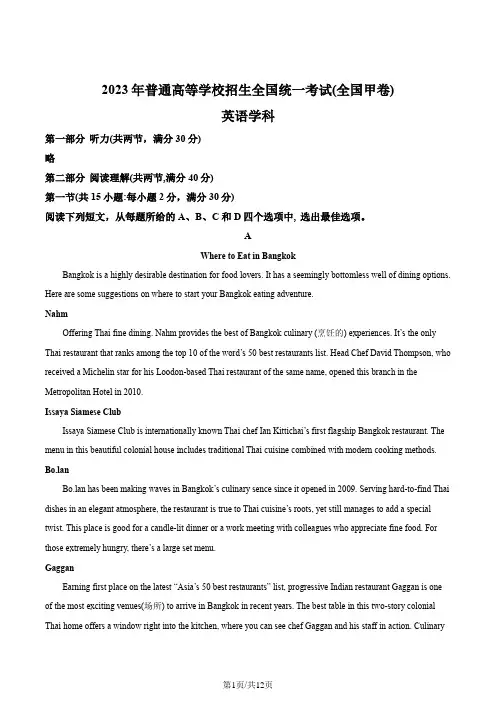
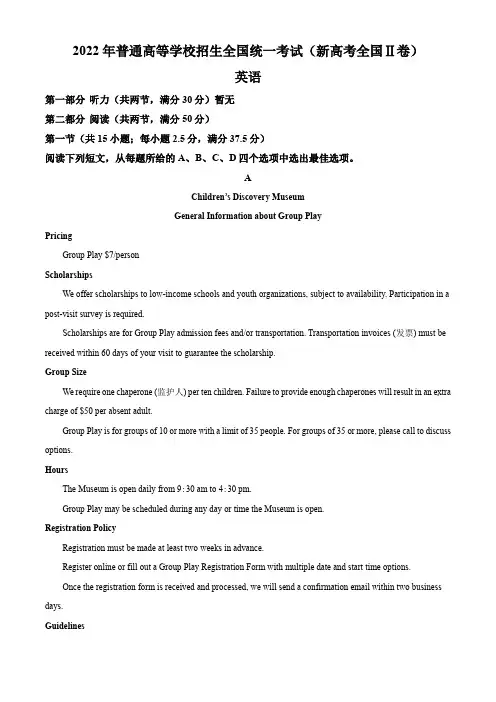
2022年普通高等学校招生全国统一考试英语第二部分阅读(共两节,满分50分)第一节(共15小题:每小题2.5分,满分37.5分)阅读下列短文,从每题所给的A、B、C、D四个选项中选出最佳选项。
AGrading Policies for Introduction to LiteratureGrading Scale90-100,A;80-89,B;70-79,C;60-69,D;Below60,E.Essays(60%)Your four major essays will combine to form the main part of the grade for this course:Essay1=10%;Essay 2=15%;Essay3=15%;Essay4=20%.Group Assignments(30%)Students will work in groups to complete four assignments(作业)during the course.All the assignments will be submitted by the assigned date through Blackboard,our online learning and course management system. Daily Work/In-Class Writings and Tests/Group Work/Homework(10%)Class activities will vary from day to day,but students must be ready to complete short in-class writings or tests drawn directly from assigned readings or notes from the previous class'lecture/discussion,so it is important to take careful notes during class.Additionally,from time to time I will assign group work to be completed in class or short assignments to be completed at home,both of which will be graded.Late WorkAn essay not submitted in class on the due date will lose a letter grade for each class period it is late.If it is not turned in by the4th day after the due date,it will earn a zero.Daily assignments not completed during class will geta zero.Short writings missed as a result of an excused absence will be accepted.1.Where is this text probably taken from?A.A textbook.B.An exam paper.C.A course plan.D.An academic article.2.How many parts is a student’s final grade made up of?A.Two.B.Three.C.Four.D.Five.3.What will happen if you submit an essay one week after the due date?A.You will receive a zero.B.You will lose a letter grade.C.You will be given a test.D.You will have to rewrite it.【答案】1.C 2.B 3.A【解析】【导语】本文是一篇说明文。
2022年成人高等学校招生全国统一考试高起点英语第Ⅰ卷(选择题,共105分)一、语音知识:共5小题;每题1.5分,共7.5分。
在下列每组单词中,有一个单词的划线部分与其他单词的划线部分的读音不同。
找出这个词。
1 . A. chair B. rich C. teacher D. headache2. A. cut B. but C. student D. must3. A. rise B. give C. life D. nice4. A. are B. dare C. care D. share5. A. bus B. desk C. fast D. easy二、词汇与语法知识:共15小题;每题1.5分,共22.5分。
从每小题的四个选择项中,选出最佳的一项。
6. The house ____ walls are made of glass looks beautiful.A. thatB. whichC. whoD. whose7. Hurry up, _____you will miss the train.A. thenB. andC. butD. or8. The young man _____a large box went out of the bank.A. carriedB. carryingC. carriesD. carry9. If he ____, he ’ll be the first Englishman to get the prize in the past ten years.A. winB. will winC. winsD. is winning10. We should protect the Earth because it is ____home.B. ourC. weD. ours11. This bus ____ the children to and from their school every day.A. takesB. will takeC. is takingD. has taken12. The bank finally agreed ____him$5,000.A. lendingB. lendsC. to lendD. lent13. She ’s far ____at English than her brother.A. betterB. wellC. goodD. best14. She ____ put the glasses on the ground.A. carefulB. carefullyC. caringD. cared15. He always gets up early _____the morning.A. inB. onC. atD. to16. It takes ____hour to reach the top of the mountain.A. aB. anC.不填D.the17. Two bridges _____ over the river five years ago.A. buildB. builtC. were builtD. are built18. The pain is so bad that she ____fall asleep at all.A. can’tB. mustn'tC. shouldn'tD. needn’t19. He ____ in London for almost 10 years.A. liveB. is livingC. livesD. has lived20.—______do you mean, you want to spend the weekend alone?A. WhyB. HowC. WhatD. Whom三、完形填空:共15小题;每题2分,共30分。
高考全国卷(新课标I)英语真题和答案〔高考〕〔英语〕在高考整一个占分的比重是十分重要的,不能忽视〔高考英语〕的成果。
以下是我为大家整理推举关于历年高考全国卷(新课标I)英语真题试题和答案分析,希望对大家有所关怀。
高考全国卷(新课标I)英语真题第一卷+答案分析第一部分听力(共两节,总分30分)略做题时,现将答案标在试卷上,录音内容结束后,你将有两分钟的时间将试卷上的答案转涂到答题卡上。
第一节(共5小题;每题1.5分,总分7.5分)(略)听下面5段对话,每段对话后有一个小题。
从题中所给的A,B,C三个选项中选出最正确选项,并标在试卷的相应位置。
听完每段对话后,你都有10秒钟的时间来回答有关小题和阅读下一小题。
每段对话仅读一遍。
例:How much is the shirt?A. 19.15B. 9.18C. 9.15答案是C。
第二部分阅读理解(共两节,总分60分)第一节(共15小题;每题3分,总分45分)阅读以下短文,从每题所给的四个选项(A、B、C、和D)中,选出最正确选项,并在答题卡该项涂黑。
AMonthly Talks at London Canal MuseumOur monthly talks start at 19:30 on the first Thursday of each month except August. Admission is at normal charges and you dont need to book. They end around 21:00.November 7thThe Canal Pioneers, by Chris Lewis. James Brindley is recognized as one of the leading early canal engineers. He was also a major player in training others in the art of canal planning and building. Chris Lewis will explain how Brindley made such a positive contribution to the education of that group of early "civil engineers'.December 5thIce for the Metropolis, by Malcolm Tucker. Well before the arrival of freezers, there was a demand for ice for food preservation and catering, Malcolm will explain the history of importing natural ice and the technology of building ice wells, and how Londons ice trade grew.February 6thAn Update on the Cotsword Canals, by Liz Payne. The Stroudwater Canal is moving towards reopening. The Thames and Severn Canal will take a little longer. We will have a report on the present state of play.March 6thEyots and Aits- Thames Islands, by Miranda Vickers. The Thames had many islands. Miranda has undertaken a review of all of them. She will tell us about those of greatest interest.Online bookings:/bookMore into:/whatsonLondon Canal Museum12-13 New Wharf Road, London NI 9RT.canalmuseum.mobiTel:020 ********21. When is the talk on James Brindley?A. February 6th.B. March 6th.C. November 7th.D. December 5th.22. What is the topic of the talk in February?A. The Canal Pioneers.B. Ice for the MetropolisC. Eyots and Aits- Thames IslandsD. An Update on the Cotsword Canals23. Who will give the talk on the islands in the Thames.A. Miranda VickersB. Malcolm TuckerC. Chris LewisD. Liz Payne【答案】21. C22. D23. A【解析】试题分析:文章主要介绍了在伦敦运河博物馆每个月的讲座支配。
2024年全国甲卷英语一、阅读理解Each ARTS FIRST festival is a unique annual celebration of the Harvard community's artistic creativity. We invite you to join us for the coming ARTS FIRST. We look forward to welcoming you as we showcase the creativity of the Harvard arts community through performances, art exhibitions and art-making activities. The festival is a public event for Harvard and community members of all ages. Light Awash in WatercolorLearn about the materials and qualities of watercolor paint with experts from the Harvard Art Museums Materials Lab. Try your hand at some of the painting tricks used by artists whose works will be in the upcoming exhibition of American Watercolors 1880-1990: Into the Light. Spineless Artists: Invertebrate CreativityFrom webs to cocoons, invertebrates (无脊椎动物) create some of nature's most delicate and beautiful designs. Join Javier Marin from the Harvard Museum of Natural History to learn how insects and other invertebrates dance, inspire fashion and create art, while making your own spineless artists out of craft (手工艺) materials. Wheel ThrowingJoin instructors from the Ceramics Program and great potters from Quincy, Cabot and Mather Houses for demonstrations using the potter's wheel. Then create your own masterpiece! Knitting and Pom-Pom MakingJoin the Harvard Undergraduate Knitting Circle to make pom-poms and tassels out of thread, or pick up a pair of needles and learn to knit (编织).1.What do we know about ARTS FIRST?A.It is an exhibition of oil paintings. B.It offers art courses for all ages.C.It presents recreational activities. D.It is a major tourist attraction.2.Which program will you join if you're interested in drawing pictures?A.Light Awash in Watercolor. B.Spineless Artists: Invertebrate Creativity.C.Wheel Throwing. D.Knitting and Pom-Pom Making.3.What can you do together with Javier Marin?A.Practice a traditional dance. B.Make handcrafts.C.Visit a local museum. D.Feed invertebrates.【答案】1.C 2.A 3.B【解析】1.根据文章第一段的“We look forward to welcoming you as we showcase the creativity of the Harvard arts community through performances, art exhibitions and art-making' activities.(我们期待着您的到来,我们将通过表演、艺术展览和艺术创作活动来展示哈佛艺术界的创造力。
2024年高考全国甲卷英语试题(含解析)(适用地区:陕西、宁夏、青海、内蒙古、四川、西藏)第一部分听力(共两节, 满分30分)第一节(共5小题; 每小题1. 5分, 满分7. 5分)听下面5段对话。
每段对话后有一个小题, 从题中所给的A、B、C三个选项中选出最佳选项。
听完每段对话后, 你都有10秒钟的时间来回答有关小题和阅读下一小题。
每段对话仅读一遍。
1. Where are the speakers going?A. A new restaurant.B. A convenience store.C. Their office.2. When is the class presentation according to Vicky?A. On Thursday.B. On Wednesday.C. On Tuesday.3. Why does the woman make the call?A. To check the price.B. To make an apology.C. To cancel her order.4. What is the probable relationship between the speakers?A. Husband and wife.B. Boss and employee.C. Salesperson and customer.5. What are the speakers mainly talking about?A. Their move to a new place.B. Tom's friends at school.C. A sports center.第二节(共15小题; 每小题1. 5分, 满分22. 5分)听下面5段对话或独白。
每段对话或独白后有几个小题, 从题中所给的A、B、C三个选项中选出最佳选项。
听每段对话或独白前, 你将有时间阅读各个小题, 每小题5秒钟; 听完后, 各小题将给出5秒钟的作答时间。
普通高等学校招生全国统一考试(全国卷I)英语第一部分听力(共两节,满分30分)做题时,先将答案标在试卷上。
录音内容结束后,你将有两分钟的时间将试卷上的答案转涂到答题卡上。
第一节(共5小题;每小题1.5分,满分7.5分)听下面5段对话。
每段对话后有一个小题,从题中所给的A、B、C三个选项中选出最佳选项。
听完每段对话后,你都有10秒钟的时间来回答有关小题和阅读下一小题。
每段对话仅读一遍。
例:How much is the shirt?A. £19.15.B. £9.18.C. £9.15.答案是C。
1.Where does this conversation take place?A. In a classroom.B. In a hospital.C.In a museum.2.What does Jack want to do?A. Take fitness classes.B. Buy a pair of gym shoes.C. Change his work schedule.3.What are the speakers talking about?A. What to drink.B. Where to meet.C. When to leave.4.What is the relationship between the speakers?A. Colleges.B. Classmates.C. Strangers.5.Why is Emily mentioned in the conversation?A. She might want a ticket.B. She is looking for the man.C. She has an extra ticket.第二节(共15小题,每小题1.5分,满分22.5分)听下面5段对话或独白。
每段对话或独白后有几个小题,从题中所给的A、B、C三个选项中选出最佳选项。
2019年全国I I卷英语高考题第二部分阅读理解(共两节,满分40分)第一节(共15小题;每小题2分,满分30分)阅读下列短文,从每题所给的A、B、C和D四个选项中,选出最佳选项。
AMy Favourite BooksJo Usmar is a writer for Cosmopolitan and co-author of the This Book Will series(系列)of lifestyle books. Here she picks her top reads.MatildaRoald DahlI once wrote a paper on the influence of fairy tales on Roald Dahl’s writing and it gave me a new appreciation for his strange and delightful words. Matilda’s battles with her cruel me parents and the bossy headmisres,Miss Trunchbull,are equally fumy and frightening,but they’re also aspirational. After DarkHaruki MurakamiIt’s about two sisters-Eri,a model who either won’t or can’t stop sleeping,and Mari, a young student . In trying to connect to her sister. Mari starts changing her life and discovers a world of diverse ”night people” who are hiding secrets.Gone GirlGillian FynnThere was a bit of me that didn’t want to love this when everyone else on the planet did but the horror story is brilliant. There’s tension and anxiety from the beginning as Nick and Amy battle for your trust. It’s a real whodunit and the frustration when you realise what’s going on is horribly enjoyableThe StandStephen KingThis is an excellent fantasy novel from one of the best storytellers around. After a serious flu outbreak wipes out % of the world’s population, a battle unfolds between good and evil among those let. Randall Flagg is one of the scariest characters ever.21. Who does “I” refer to in the textA. Stephen King.B. Gillian Flynn.C. Jo Usmar.D. Roald Dahl22. Which of the following tells about Mari and EriA. Cosmopolitan.B. Matilda.C. After Dark.D. The Stand.23. What kind of book is Gone Girl)folk tale.biography.love story.horror story.B“You can use me as a last resort(选择), and if nobody else volunteers,then I will do it.” This was an actual reply from a parent after I put out a request for volunteers for my kids lacrosse(长曲棍球)club.I guess that there’s probably some demanding work schedule, or social anxiety around stepping up to help for an unknown sport. She may just need a little persuading. So I try again and tug at the heartstrings. I mention the single parent with four kids running the show and I talk about the dad coaching a team that his kids aren’t even on … At this point the unwilling parent speaks up,“Alright. Yes, I’ll do it.”I’m secretly relieved because I know there’s real power in sharing volunteer responsibilities among many. The unwilling parent organizes the meal schedule, sends out emails, and collects money for end-of-season gifts. Somewhere along the way, the same parent ends up becoming an invaluable member of the team. The coach is able to focus on the kids while the other parents are relieved to be off the hook for another season. Handing out sliced oranges to bloodthirsty kids can be as exciting as watching your own kid score a goal.Still, most of us volunteers breathe a sigh of relief when the season comes to a close. That relief is coupled with a deep understanding of why the same people keep coming back for more: Connecting to the community(社区)as you freely give your time, money, skills, or services provides a real joy. Volunteering just feels so good.In that sense, I’m pretty sure volunteering is more of a selfish act than I’d freely like to admit. However, if others benefit in the process, and I get some reward too, does it really matter where my motivation liescan we infer about the parent from her reply in paragraph lA. She knows little about the club.B. She isn’t good at sports.C. She just doesn’t want to volunteer.D. She’s unable to meet her schedule.does the underlined phrase“tug at the heartstrings”in paragraph 2 meanA. Encourage team work .B. Appeal to feeling.C. Promote good deeds.D. Provide advice.26. What can we learn about the parent from paragraph 3A. She gets interested in lacrosse.B. She is proud of her kids.C. She’ll work for another season.D. She becomes a good helper.27. Why does the author like doing volunteer workA. It gives her a sense of duty.B. It makes her very happy.C. It enables her to work hard.D. It brings her material rewards.CMarian Bechtel sits at West Palm Beach’s Bar Louie counter by herself, quietly reading her e-book as she waits for her salad. What is she reading None of your business! Lunch is Bechtel’s “me” time. And like more Americans, she’s not alone.A new report found 46 percent of meals are eaten alone in America. More than half(53 percent)have breakfast alone and nearly half(46 percent)have lunch by themselves. Only at dinnertime are we eating together anymore,74 percent,according to statistics from the report.“I prefer to go out and be out. Alone,but together,you know”Bechtel said,looking up from her book. Bechtel,who works in downtown West Palm Beach,has lunch with coworkers sometimes,but like many of us,too often works through lunch at her desk. A lunchtime escape allows her to keep a boss from tapping her on the shoulder. She returns to work feeling energized. “Today,I just wanted some time to myself,”she said.just two seats over,Andrew Mazoleny,a local videographer,is finishing his lunch at the bar. He likes that he can sit and check his phone in peace or chat up the barkeeper with whom he’s on a first-name basis if he wants to have a little interaction(交流). “I reflect on how my day’s gone and think abou t the rest of the week,” he said. “It’s a chance for self-reflection, You return to work recharged and with a plan.”That freedom to choose is one reason more people like to eat alone. There was a time when people may have felt awkward about asking for a table for one,but those days are over. Now,we have oursmartphones to keep us company at the table. “It doesn’t feel as alone as it may have before al the advances in technology,” said Laurie Demerit,whose company provided the statistics for the report.28. What are the statistics in paragraph 2 aboutA. Food variety.B. Eating habits.C. Table manners.D. Restaurant service.29. Why does Bechtel prefer to go out for lunchA. To meet with her coworkers.B. To catch up with her work.C. To have some time on her own.D. To collect data for her report.30. What do we know about MazolenyA. He makes videos for the bar.B. He’s fond of the food at the bar.C. He interviews customers at the bar.D. He’s familiar with the barkeeper.31. What is the text mainly aboutA. The trend of having meals alone.B. The importance of self-reflection.C. The stress from working overtime.D. The advantage of wireless technology.DBacteria are an annoying problem for astronauts. The microorganisms(微生物)from our bodies grow uncontrollably on surfaces of the International Space Station, so astronauts spend hours cleaning t hem up each week. How is NASA overcoming this very tiny big problem It’s turning to a bunch of high school kids. But not just any kids. It depending on NASA HUNCH high school class, like the one science teachers Gene Gordon and Donna Himmelberg lead at Fairport High School in Fairport, New York.HUNCH is designed to connect high school classrooms with NASA engineers. For the past two years, Gordon’s students have been studying ways to kill bacteria in zero gravity, and they think they’re close to a solution(解决方案). “We don’t give the students any breaks. They have to do it just like NASA engineers,” says Florence Gold, a project manager.“There are no tests,” Gordon says. “There is no graded homework. There almost are no grades, other than‘Are you working towards your goal’ Basically, it’s ‘I’ve got to produce this product and then, at the end of year, present it to NASA.’ Engineers come and really do an in-person review, and…it’s not a very nice thing at time. It’s a hard business review of your product.”Gordon says the HUNCH program has an impact(影响)on college admissions and practical life skills. “These kids are so absorbed in their studies that I just sit back. I don’t teach.” And that annoying bacteria Gordon says his students are emailing daily with NASA engineers about the problem, readying a workable solution to test in space.do we know about the bacteria in the International Space StationA. They are hard to get rid of.B. They lead to air pollution.C. They appear different forms.D. They damage the instruments.33. What is the purpose of the HUNCH programA. To strengthen teacher-student relationships.B. To sharpen students’ communication skills.C. To allow students to experience zero gravity.D. To link space technology with school education34. What do the NASA engineers do for the students in the programA. Check their product.B. Guide project designsC. Adjust work schedules.D. Grade their homework.35. What is the best title for the textA. NASA: The Home of Astronauts.B. Space: The Final Homework Frontier.C. Nature: An Outdoor Classroom.D. HUNCH:A College Admission Reform.第二节(共5小题;每小题2分,满分10分)根据短文内容,从短文后的选项中选出能填入空白处的最佳选项。